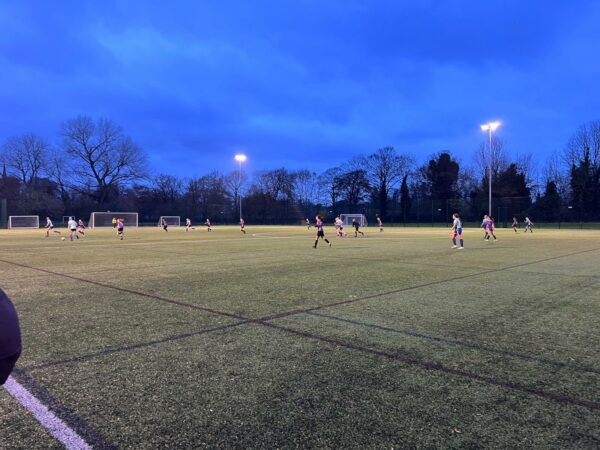“This is the best job in the world”: UOMWFC’s Head Coach Rob McKay on how women’s football at university is thriving

“The standard of freshers has got better every single year,” says the coach in charge of the development of the University of Manchester’s Women’s Football Club. Amidst the exponential growth of women’s football in the country, I sat down with Head Coach, Rob McKay to find out his perspective on the development of the University’s own women’s football club. He is in charge of the four teams that the club currently boasts, with three of these competing in BUCS, and their three other respective coaches.
Starting his career as a media officer for West Didsbury and Chorlton AFC, Rob joined as a head coach in 2019, following stints both in coaching and administration.
Since his introduction, the club has gone from strength to strength. “There are people that are in the second team now that would have been in the first team four years ago,” says Rob. “And there are people in the third team now who would have been borderline [between] the first and second team.”

With this progression has come a strong club identity, “all about sporting excellence but combined with an education,” Rob promotes a culture that aims to never prioritise footballing excellence “at the expense of your degree.”
Recognising the balance between student and athlete in ‘student-athlete’, he expands to say that the club wants each student to “have the skills that you’ll need later in life”, qualities such as “honesty and commitment and accountability,” so that playing at university level improves the player “on and off the pitch.”
He might want “100% graduation over a league title,” but that hasn’t stopped UOMWFC from winning two titles over their three BUCS teams in the past three years, narrowly missing out on a third from last year’s third team, and is expecting to build on the progression of the last few years in this current season. Two of the club’s recent alumni have even joined professional clubs over the summer, attesting to the recent development of women’s football at the University of Manchester.
The progression has only just started in Rob’s eyes. He “would like to see us fulfil what we can do … [and] grow more towards participation,” even casting an eye towards “Sunday football as a possibility,” in order to attract players who might struggle with the midweek games and those who want to play more football.
There’s a great recognition of the effect that the professional women’s game has had on the university standard, and there is added excitement as Rob assesses that “women’s football is growing quicker than people can [even] administer it.”
“There are people coming through now,” he says, “who want to push on and play the best they can, wanting high standards.” This is a move away from what Rob calls the “generation of players who have never been coached correctly,” referring to how greatly, for the better, grassroots football and societal acceptance of female players have changed.
The excitement surrounding the women’s game, locally and nationally, is emblematic of this, as “the staff at reception … [are] excited about the WSL now.” When Rob started, he says, there was mostly “no interest in football at all.” The international success of the Lionesses has trickled down; now “some people miss training to [go] to United on a Friday night,” and women’s football is now more visible.

Interestingly enough, while Rob is extremely excited about the direction of the women’s game growing towards the level of the men’s, he hopes that the culture of the women’s game does not follow suit. He expresses that it is “very different in terms of attitude.” People will accept and tolerate things in the men’s game, he explains, that you wouldn’t tolerate in a normal society. These things are “absolutely not tolerated in women’s football.”
Fearful that “every time there’s a world-class woman, there’s always a mediocre man around her,” Rob explains that not all coaches recognise this cultural difference but “really hope[s] that this is a new culture” and doesn’t change. Besides the need to “show that extra level of respect,” he distinguishes the difference between the “signing the player you want to make the team better” mentality in men’s football and the “developing the individual” mentality in women’s football.
Rob takes this into his own coaching, feeding into his holistic approach to the development of player and person, the fruits of which could be seen most clearly in the final game of last season, his proudest moment at the club.
This game was the first team playing the second team after the first team had won the league, and “it was just really good to know that the ones and twos were competing as equals.” “It was first versus third [in the league],” Rob explains, “and just to see all thirty-two players all representing the University playing in the same style of play with the same attitude and positivity … was a really amazing moment.”
Amid the occasional loneliness of university football and life, seeing the community feel of the club was “massive” to Rob. It wasn’t about the first team and the second team, but about the University of Manchester Women’s Football Club.
To find out more about the University of Manchester’s Women’s Football Club contact via Instagram.







